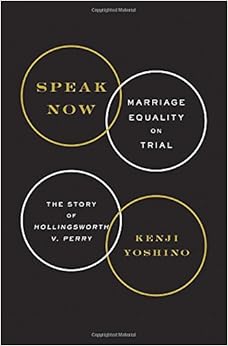This is probably a good time to let y’all know that as a matter of principle I cannot support a book with double subtitles. I’m not about that life. The full title of this book is Speak Now: Marriage Equality on Trial: The Story of Hollingsworth v. Perry, and someone needed to cut back on at least 30% of that mess before they published this book.

Having said that, Speak Now reminded me of everything I love about reading nonfiction and everything I love (and hate) about the American legal system. The author, Kenji Yoshino, carefully lays out the facts of Hollingsworth v. Perry, a case that challenged California’s Proposition 8 (remember that?). The US District Judge who received the case, Vaughn Walker (remember him?), insisted that it go to a trial — albeit an expeditious one — which led, ultimately, to the broadest record of evidence on the merits of arguments for and against marriage equality.
A legal scholar himself, Yoshino writes lucidly and carefully about the issues at stake in the trial. I had to go back and reread some of his definitions a few times to be sure that the information took root in my brain, but he’s definitely writing for a lay audience, with plenty of contextual explanations for the arguments and decisions being made.
Most importantly, this book finally explained to me why Iowa got gay marriage so early, a question that has been bothering me at a low level ever since my flatmates in England asked me about it years and years ago. Here is the reason: In the early 2000s, when legal groups for marriage equality were laying out a strategy to pursue the legalization of gay marriage state by state, they deliberately targeted states where it’s difficult to amend the constitution. In general, states that joined the Union early have harder-to-amend constitutions, and states that joined later have easier ones. Iowa, for whatever reason, has a hard-to-amend constitution, and that is why Iowa was targeted along with a bunch of New England states.

Also there was this anecdote: Yoshino was offered the Earl Warren Professorship of Constitutional Law by the dean of NYU Law School. He declined because Earl Warren, as attorney general of California, had approved the internment of Japanese-descended Americans during World War II. The dean said he’d get back to him in a couple of days with the name of a new chair.
He called me back and offered me the Chief Justice Earl Warren Professorship of Constitutional Law. Repressing a lot of reactions, I asked him how the addition of “Chief Justice” could possibly make a difference. He answered that he had spent the intervening days rereading a biography of Earl Warren, and learned that as Chief Justice, Warren had expressed regret for his actions during the internment.
“Wouldn’t it be great,” he asked, “if your chair embodied how much an individual can grow over a single lifetime?”
NO YOU GOT TEARY. SHUT UP.